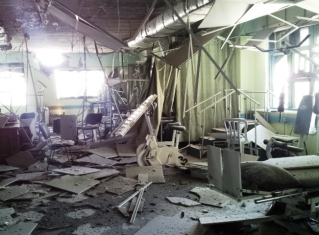 20 May 2016 – Saving lives in a number of countries of the WHO’s Eastern Mediterranean Region is a dangerous profession. Escalating conflict and the massive scale of humanitarian needs continue to place health care workers at great risk. Attacks against health workers and facilities in Afghanistan increased by 50% in 2015, and Syria is now the deadliest place in the world for health workers, with attacks taking place at a disturbing rate and reducing the availability of an already limited number of health care workers.
20 May 2016 – Saving lives in a number of countries of the WHO’s Eastern Mediterranean Region is a dangerous profession. Escalating conflict and the massive scale of humanitarian needs continue to place health care workers at great risk. Attacks against health workers and facilities in Afghanistan increased by 50% in 2015, and Syria is now the deadliest place in the world for health workers, with attacks taking place at a disturbing rate and reducing the availability of an already limited number of health care workers.
Attacks on health care do not occur only as a result of direct violence. Threats to health workers, patients and health facilities also take place through intentional withholding of medicines and treatment to besieged populations, and through deliberate interruptions to water and power supplies, reducing the functionality of health facilities.
There are clear laws and conventions not to attack health workers or health facilities, yet these are not being complied with. Despite repeated calls for the respect and protection of health care by the United Nations and the International Committee of the Red Cross, these attacks continue, depriving people of their fundamental right to health, severely disrupting humanitarian operations and undermining health systems and long-term health development goals. We must not accept this as the status quo.
In countries where the number of attacks seems to be decreasing, this should not be taken as a sign that the country is now safer for humanitarian operations. In fact, the reason may be a decreasing population of health workers that can be targeted as health workers flee, health facilities shut down, and response operations by aid agencies are reduced due to insecurity.
Attacks on health care – whether they are targeted or as a result of large-scale violence – have an impact that goes beyond the risks to health workers’ lives, affecting not only the families of the victims, but also the millions of people who could not be reached, children who did not get vaccinated, and patients whose injuries were left untreated. Thousands of people die every year not as a direct result of the violence, but because the environment has become too dangerous for health care to be delivered. These consequences should not be accepted as the unavoidable cost of operating in conflict settings – we must do all we can to stop these attacks.
Health staff working in under already challenging conditions and with limited resources should not have to live in fear of constant attack, and the populations they reach cannot afford to be deprived of what little they have in terms of health services. In the fragile states that are experiencing severe instability, we cannot allow the thread connecting health workers and people in need to be severed.
Without health workers, there can be no health care, and protecting health care workers is one of the most pressing responsibilities of the international community. The landmark resolution on health care in armed conflict unanimously adopted by the United Nations Security Council on 3 May serves as an important step in highlighting the urgency of this issue.
Together with partners, WHO is establishing a system for collecting data on attacks on health workers, health facilities, transport, and patients in complex emergencies. This information will be used to identify patterns and find concrete ways to avoid attacks or mitigate disruptions to health care delivery.
As the international community continues to advocate for the protection of health care workers, governments have an equally important role to play by ensuring safe and secure access to health services for all and strengthening accountability for attacks on health. Beyond the health sector, civil society, media, and international institutions have a key role in ensuring that violations are brought to light. Unless immediate action is taken by all to protect health workers and health facilities, these attacks will continue, threatening to become the norm and sealing the fate of millions of people.
“Respect the rules of war” is one of the 5 core responsibilities for the global community that UN Secretary-General Ban Ki-moon outlines in his Agenda for Humanity – a report to guide discussions and decisions at the first-ever World Humanitarian Summit which takes place in Istanbul on 23–24 May.
Istanbul is the opportunity for us all to come together to make a strong call on all parties to armed conflict to respect the rules they have endorsed in international humanitarian and human rights law.
I sincerely hope that this Summit will be the “turning point” that the UN Secretary-General calls for, and will lead to a strengthened commitment by world leaders, international organizations, aid providers, the private sector and citizen groups to act upon our individual and shared responsibilities for humanity.
Dr Ala Alwan
WHO Regional Director for the Eastern Mediterranean



